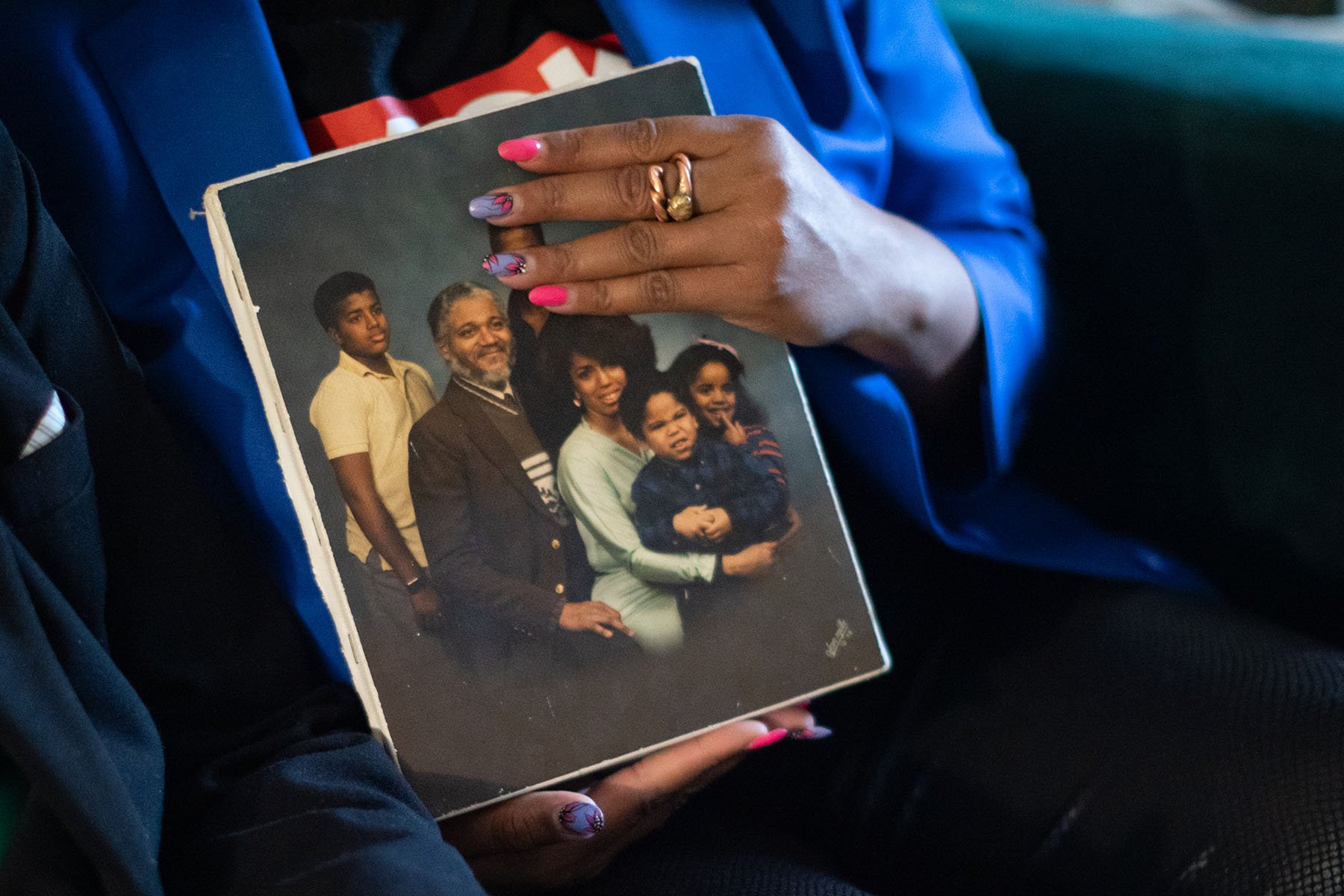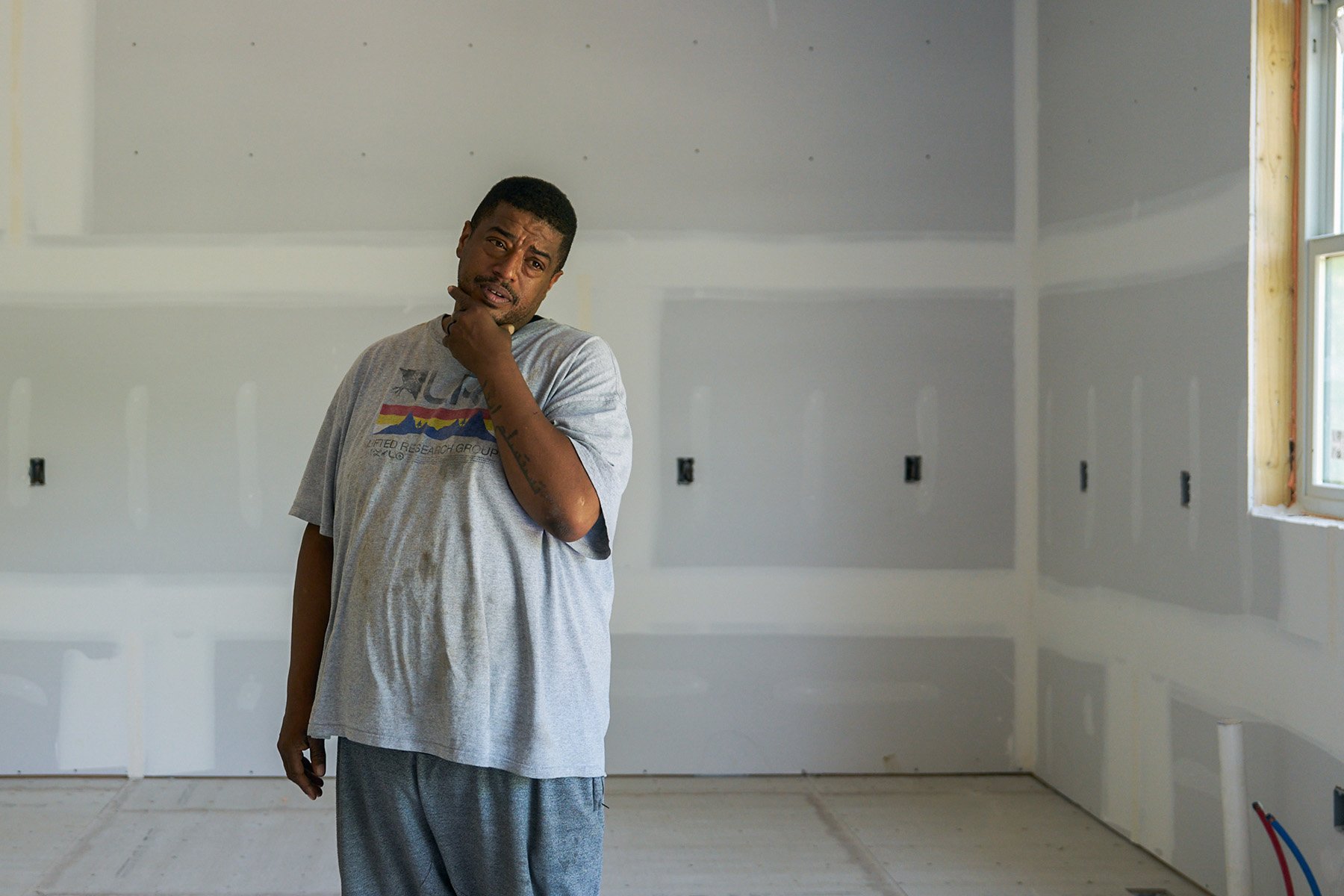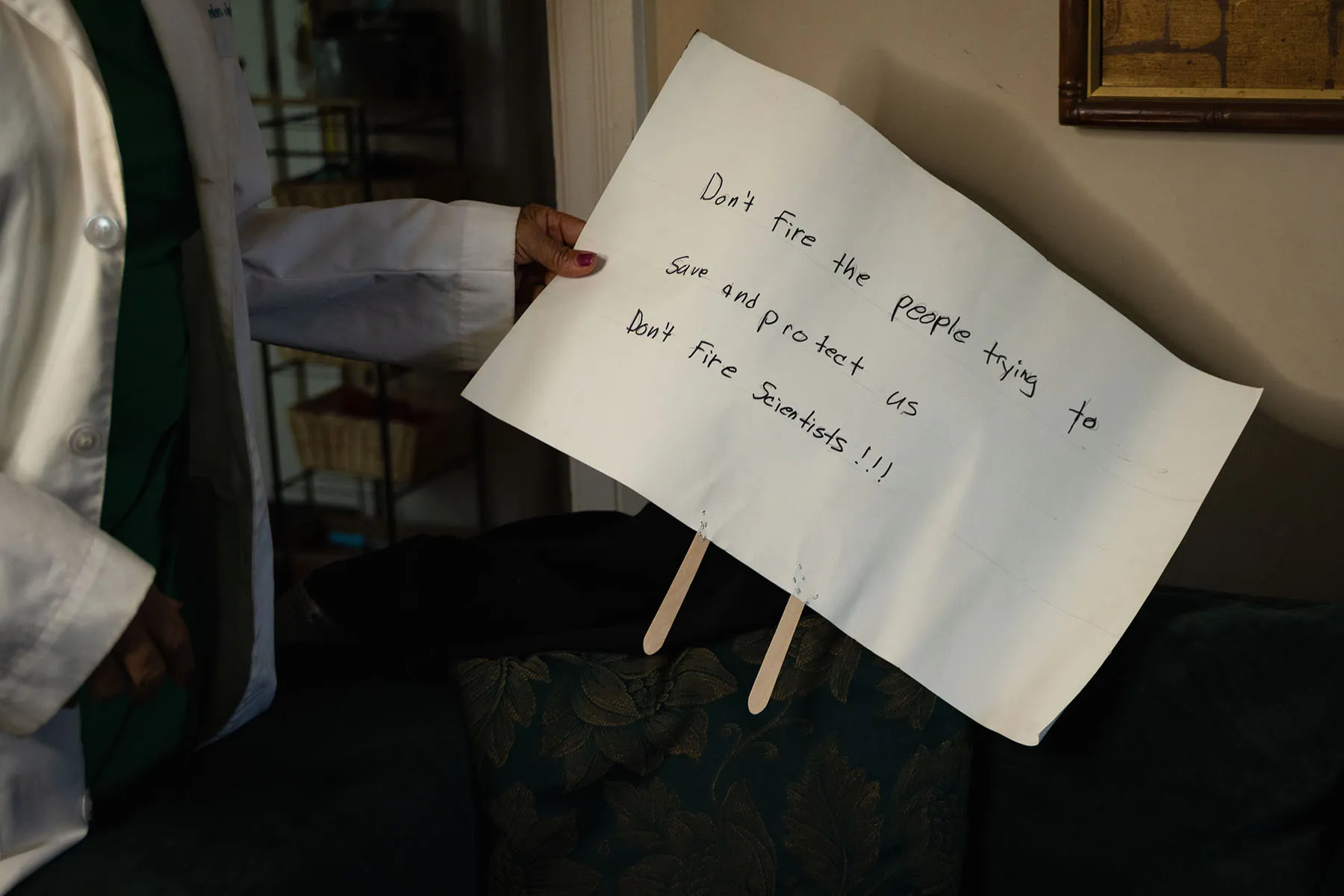Helen Jackson, a nuclear physicist with decades of experience and a patent under her belt, was excited about a new job at the U.S. Patent and Trademark office, a return to physics after years of contract work related to artificial intelligence.
But a few weeks before her start date, President Donald Trump was inaugurated and, as one of his first presidential actions, ordered a federal hiring freeze.
Jackson immediately emailed her onboarding officer to ask for clarification on her job status. The response: “We must rescind our offer of employment.”
“I was pretty devastated because I had been very excited about getting back to what I really, really love: physics, my core interest and line of education,” said Jackson, a trailblazing Black woman in physics, engineering and machine learning. “It’s been an upending time for me. And not just me, but my entire family has been drastically affected.”
Jackson’s five children — a nonprofit executive, an academic, a construction company owner, a Marine veteran and a data engineer — have all felt the impact of the first 100 days of Trump’s second term. Jackson’s story and those of her children reflect the reality of hundreds of thousands of Americans as the president has quickly moved to reduce the federal government’s size; eradicate diversity, equity and inclusion programs; and impose steep tariffs on other countries.
The 19th spoke with four members of this one family several times between February and April 2025, though two declined — including a university professor and researcher who works with federal health data who said she could not talk as her university has taken legal action against the Trump administration.
-
Read Next:
Jackson has had a long, complicated work history with the federal government — which she has always seen as a good, stable path for Black women scientists who lacked opportunity and benefits elsewhere. She started her career working for NASA, where she deeply enjoyed working on satellite systems and space shuttle launch support. Later in her career, however, she was terminated alongside several other non-White scientists while working at the Air Force Research Lab. She filed a discrimination lawsuit that has since been settled. Still, she was looking forward to returning to what she thought would be a fulfilling and secure role.
Now, Jackson said, she sees Trump’s actions as jeopardizing more than her career or those of some of her children. She worries about the impact of the administration on other Black people and whether its efforts to eliminate diversity, equity and inclusion (DEI) programs will not only stop progress that has been made but set the country back.

“I think many people, including those that voted for him, had no idea that it would be this catastrophic,” Jackson said. “I knew the DEI problem was coming; I saw those dark storm clouds. But I had no idea to what extent this administration was going to carry things. I think this administration has put us back to the 1920s in terms of racial discrimination. It wasn’t even this bad when I was a young girl growing up, the villainizing and demonizing of anything they perceive as DEI. What they mean by DEI is Black.”
Jackson is one of tens of thousands impacted by the hiring freeze and mass layoffs, part of an initiative of the Trump administration and billionaire Elon Musk to cut what they see as waste and slash the federal budget by billions of dollars.
“They have said government workers are lazy and that these government agencies are full of fraud and abuse,” Jackson said. “Meanwhile, a lot of scientists in the federal government are humanitarian and have a passion to make the world better, safer or healthier. It’s not the highest-paying field, and it’s really frustrating to label us the way this administration has labeled us.”
The so-called Department of Government Efficiency, Musk’s cost-cutting effort, has fired more than 58,000 federal employees as of April 2025, and that’s not including the 76,000 who have reportedly taken deferred buyouts.
“It’s been a roller coaster here in D.C., and I was very depressed for a few weeks,” Jackson said. “So many people have been terminated. I hear people saying they’re going to leave the city, maybe even the country. I don’t know what things are going to look like in a few months.”
And the ripple effects extend past D.C. She sees how her children, scattered across the country, are also struggling in varying ways.
“With so many people in the family being impacted, it’s a little bit harder for us to help each other out,” Helen Jackson said. “Everybody’s impacted. Everybody’s been hurt financially.”
Zakiya Jackson, 42, is Helen Jackson’s fourth child. The two live together in Washington, D.C. She is the president of The Expectations Project, a nonprofit focused on public education for Black, Brown and other marginalized children.
Zakiya Jackson said 2023 was a “tremendous, wonderful banner year” for the organization, which brought in significantly more than its annual budget of $1 million. Then in 2024, fundraising slowed to about $100,000. This year, so far she’s gotten just one funder to commit to $50,000.
“We had some funders be really spooked by the election results,” Zakiya Jackson said. “They say they are stepping back, regrouping or not funding — or at least not sure if they want to fund public education anymore or aren’t sure about things related to racial equity.”
The funders tend to be foundations started by wealthy families, Zakiya Jackson said. From conversations she’s had, funders seemed concerned about repercussions if they didn’t comply with the Trump administration’s priorities and continued to focus on diversity or education initiatives.

Trump has issued several executive orders aimed at ending diversity, equity and inclusion (DEI) programs — including one that ended diversity considerations in federal funding decisions. These moves targeted institutions — both inside and outside of the government — that focused on DEI in any capacity, including organizations like Zakiya’s that focuses on racial disparities.
“There are so many things happening that don’t follow the type of logic that people are used to,” she said. “There’s all sorts of fears around if an organization is associated with a nonprofit that explicitly addresses race, is that going to backfire in some sort of way? Is that a bad strategic choice for a business or foundation?”
The Expectations Project, which does not receive funding directly from the federal government, helps community organizers around the country connect with faith communities to help kids in schools. For example, it has organized digital campaigns and tool kits to defeat book ban legislation on the state level and worked with another group to combat child poverty.
“Some in the funding community are concerned about longevity, asking, ‘How can we sustain? How do we keep doing good work? Do we need to change language and still try to do the work anyways?’” Zakiya Jackson said. “I empathize with how paralyzing fear can be sometimes. I’m asking, ‘How do we do this? Are there things that we have to abandon right now? How do we keep supporting our communities?’”
The Expectations Project late last year furloughed its six-person staff; right now, it’s just Zakiya Jackson and two others, all working part time. They’ve had to pause new content creation and become more selective about the number of digital advocacy campaigns they can do.
“I don’t feel like all hope is lost, but this is definitely hard — the hardest thing I’ve ever done in my career,” Zakiya Jackson said. “And it’s an unknown future while I look in the face of high need.”
Zakiya Jackson has lived with her mother since 2020 — and both are feeling the financial strain of unemployment and decreased work hours.

Helen Jackson continues to weigh her job options and consider how far she is willing to commute every day. She said she has had to cut her food budget in half and limit how often she drives her car to save on gas money. She is also growing a large garden, “so at least I will have food in the summer,” she added.
“I’ve had to navigate through some tough times before, and I know how to be creative and innovative — whatever you want to call it,” Helen Jackson said. “I’ve particularly noticed that my daughter has gotten a lot, a lot more careful.”
Zakiya Jackson said money has gotten tight enough that her friends now offer to pay for her meals if they go out, and a brother nearby helps cover little things around the house. Zakiya has started looking into ways to earn supplemental income through consulting and Helen says she’s mulling over the idea of renting another apartment closer to prospective employers to save on commuting time and costs.
“A sense of community, mutual aid and collective care is strong for me right now, which I’m really grateful for,” Zakiya Jackson said. “I’ve also been intentionally dealing with the discomfort of the unknown through exercise, yoga and art journaling — just painting my feelings.”
Helen Jackson’s youngest, 40-year-old John Jackson, is based in Miami, works at a big financial firm and is a Marine veteran. Though he said he hasn’t been as directly affected financially as the women in his family, he knows veterans who were impacted by the hiring freezes and mass federal workforce reduction. He also knows veterans across the political spectrum who have been protesting the government’s “really extreme” actions.
“I think it’s really hard to make the argument that this administration is pro-veteran or pro-military,” said John Jackson, an Iraq War veteran who served on active duty from 2007 and 2013. “I’m sure they can spin it in a way that it seems that way, but the actions so far don’t indicate that.”
Trump’s pick for defense secretary, Pete Hegseth, moved quickly in his first few months in office to fire top women generals and admirals’ completely eradicate diversity, equity and inclusion initiatives; and order fitness standards to be gender neutral.

“Some things that are happening are just really unprecedented,” said John Jackson, who is also part of a veteran podcast group. “When you’re taking diversity, equity and inclusion out of everything — culture wars have officially won. The manufactured crisis that really wasn’t a crisis is not in policy and law.”
John Jackson said he is frustrated that more people are not aware of how this administration’s policies are harming regular Americans’ lives.
“I really hate what happened to my mom — she didn’t deserve that,” John Jackson said, referring to her rescinded job offer. “I have two sisters, and this greatly impacted their ability to do their jobs and get funding. So honestly, I really resent the administration for that. Most people would agree that the government has waste, but they’re not going about this in a thoughtful, correct way. It’s really haphazard and callous, and I think the American people have to stand up against this.”
Isa Conway, 51, another one of Helen’s children, is based in Goodlettsville, Tennessee, a rural and largely Republican suburb of Nashville. He said his construction business has suffered.
The cost of building materials is on the rise due to Trump’s tariff war with Canada — which is the primary supplier of softwood lumber products to the United States.
“In 2020 during the pandemic, the cost of building materials went up,” Conway said. “And now people are talking about the cost going up even higher than last time. For example, a two-by-four before the pandemic was around $2 and during the pandemic, the cost rose to more than $6. I expect it’s going to be pushing $10 in the coming months.”

Conway said he is in the process of buying a lot in the Cayman Islands. He plans to build condominiums there, with the materials sourced from Jamaica to avoid paying the tariffs.
“I’m quite sure the U.S. is the nicest place in the world to live in general, but at the end of the day, there’s plenty more opportunity out there where I can make a better life for myself and take a shot at what the rest of the world has to offer,” Conway said.
Conway said he hasn’t gotten a single new job in six months and is just working on finishing some houses and one large project he locked in last year: the building of a $4 million golf pro shop that will likely take another year or two to complete.
“I’ve never been this low; I’ve never not had stuff lined up,” Conway said, including after the recession in 2008 when he lost his home.
In addition, Conway said the Trump administration’s immigration policies are making his subcontractors — the vast majority of whom are undocumented immigrants — leery of being in public and working on the construction sites.
Most of these subcontractors pay taxes, Conway added, so they became increasingly concerned when reports revealed the Trump administration was going to use the Internal Revenue Service to target and deport immigrants. So far, three of his subcontractors have been deported and several others were arrested but allowed to stay in the country.
“When they get in trouble, they call me bawling in tears,” Conway said. “They break down, Lord have mercy, they get panicking. They’ll be arrested for a minor charge, and they just know they’re never going to see their families again.”

Conway also said there’s been a notable shift in his own community toward Black people. Conway was with his wife and daughter when a pickup truck with a large Trump flag pulled up next to them. The truck’s driver started blowing the horn, stuck up his middle finger and yelled, “Get the hell out of our city!” His son has also been getting in fights at school as other students use racial slurs and tell him he doesn’t belong there.
“I can deal with financial hardships — I’ll figure it out — but it’s more people’s attitudes that’s been the most devastating for us,” Conway said.
Though people were disrespectful during Trump’s first presidency, Conway noted that the harassment and vitriol seem more pronounced this time.
“People are empowered to do and say whatever they want — like if you see a White dude walking around with a Make America Great Again hat, you just have to avoid them because you never know what’s about to happen,” he said.
Thinking back to November when Trump was elected, Helen Jackson said she was “cautiously optimistic.”
She did not predict the chaos that was coming for federal workers, for Black people, for her own family.

She had felt a strong sense of safety in the federal government and nation. Her ancestry line includes many veterans, including an uncle who was a Tuskegee Airman — one of the first Black military aviators that fought in World War II. Helen Jackson said it was “heartbreaking” to see the current administration try to minimize the contributions of her people and erase history.
“Even with all of the struggles that I’ve had to overcome, I’ve never felt quite this way,” Jackson said. “A lot of people are scared and the overall plight of the United States of America looks very scary. There’s just bleak uncertainty of not knowing what the future holds.”






